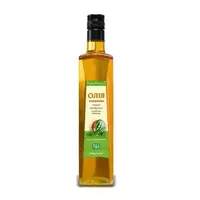Watermelon seed oil

Watermelon seed oil is called vegetable oil, which is usually obtained by cold squeezing seeds of ordinary watermelon, which contain up to twenty-five percent fatty oil. The process of making this product itself provides for the preliminary purification of seeds from the shells and their drying in the sun. After drying, the seeds are crushed and subjected to cold pressing, the purpose of which is to extract oil.
Mainly watermelon seed oil is made and used in the countries of West and South-West Africa (Botswana, Lesotho, Namibia, South Africa), where it is also called Kalahari oil and is widely used for food purposes. In addition, due to the ability of this oil to absorb well into the skin, it is used as an emollient or is included in cosmetic skin care preparations.
Outwardly, watermelon seed oil is a rather thick liquid, which is characterized by a pale greenish-yellow color and a weak smell. In general, in terms of its physicochemical properties, watermelon seed oil is similar to almond oil, and resembles olive oil in taste.
Watermelon seed oil does not dissolve in water, has weak solubility in ethyl alcohol, while it is highly soluble in diethyl ether, chloroform and toluene. It contains mainly triglycerides of unsaturated acids - oleic and linoleic. In addition, watermelon seed oil contains a considerable amount of linolenic and palmitic acids along with stearic, myristine and several others.
Due to the content of mono - and polyunsaturated fatty acids oleic and linoleic, which in turn are part of the essential Omega-3 fatty acids, the use of watermelon seed oil contributes to the activation of the synthesis of prostaglandins - energy managers in the human body. In addition, this product helps to reduce blood pressure, stimulates the production of hormones, restores the sensitivity of nerve fibers, improves the hemodynamics of renal blood flow and increases the filtration renal function.
Carotenoids, tocopherols, folic acid, as well as trace elements such as selenium and zinc are contained in natural oil of watermelon seeds in an increased concentration, which causes it to be anti-inflammatory, diuretic (diuretic), antioxidant, membrane-stabilizing, capillary-strengthening, immunomodulatory, oncoprotective, cardiovascular, antianemic, antisclerotic and stimulating gastrointestinal peristaltics.
When using watermelon seed oil, a pronounced diuretic effect is noted, as well as a change in the composition of urine at the physicochemical level: mucus, salts disappear, small nodules and sand dissolve, inflammatory processes in the bladder, renal pelvis and urinary tract decrease. This prevents the development of urolithiasis, gout, metabolic disorders, osteochondrosis, polyarthritis and other serious diseases.
899 kCal watermelon bone oils
Energy value of watermelon seed oil (Ratio of proteins, fats, carbohydrates - ju):
Proteins: 0 g (~ 0 kCal)
Fats: 99.9 g (~ 899 kCal)
Carbohydrates: 0 g (~ 0 kCal)
Energy ratio (b | y): 0% | 100% | 0%
 Español
Español Français
Français Português
Português Русский
Русский 简体中文
简体中文 繁體中文
繁體中文 日本語
日本語 한국어
한국어 العربية
العربية Türkçe
Türkçe Қазақ
Қазақ Deutsch
Deutsch Italiano
Italiano Українська
Українська
